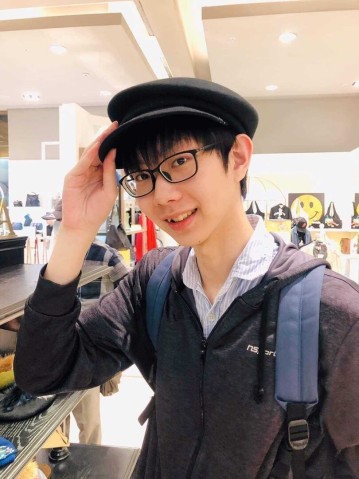Previous Rotation Students

AY2023

Johanna Johansson
メール: Email
September - December 2023
2020 MSc Marine Biology from James Cook University
2016 BS Marine Biology from Hawaii Pacific University
I have always been interested in science and when I was 14, I decided that I wanted to become a marine biologist. Since I am originally from Sweden and my interests were more in tropical oceans I moved abroad for my education. My research interests are in ecology, genetics and organisms’ responses to climate change. I am now in my first year here at OIST and undergoing my out-of-field rotation. I do not know much about chemistry or polymers, but I am excited to learn. I will help with the microplastics project, thus combining my love for marine biology with learning something new. In my free time I go diving and exploring Okinawa.

AY2022


Shin Sun
メール: Email
Degree : BSc. in Chemistry, National Taiwan University, Taipei, Taiwan 2020
Research Interest : My previous research focuses on the application of quantum computers to the simulation of open quantum system dynamics. After joining OIST, I have finished two rotation projects. One is about quantum information theory, and another is about trapped-ion quantum computer design. In this rotation, I would like to focus on applying machine learning techniques to automated plastic waste monitoring.

Abdulrahman Bakry
メール: Email
January 2023 – April 2023
February 2021: M. Sc. (Applied Organic Chemistry), Kafrelsheikh University, Egypt.
June 2015: B. Sc. (Chemistry). Faculty of Science, Kafrelsheikh University, Egypt.
After graduation from Faculty of Science, Kafrelsheikh University, Egypt, I worked as a member of research project for synthesis and characterization of organic and polymeric materials and its applications in electronic fields and optical cells, then I performed pre-master studies in 2017-2018 and finallyI obtained my M. Sc. degree in applied organic chemistry with thesis entitled "Synthesis and Spectroscopic Studies of Some π-Conjugated Organic and Polymeric Materials" in February 2021. During my master research, I worked on synthesis of several monomeric and oligomeric organic materials, based on the donor-acceptor (D-A) system, photophysical, electrochemical, and morphological investigations of the synthesized polymers for optoelectronic applications.
I joined OIST as a Ph.D. student in September 2022 and finished my first rotation. Then, I joined Prof. Christine research group for the second rotation, and I hope I could continue as a Ph.D. student. My rotation research will focus on synthesis of polymeric mixed ionic-electronic conductors (MIECs) that combine properties of conjugated polymers, polyelectrolytes , and polymer electrolytes to transport and couple ionic and electronic charges concurrently. In these mixed conductors, ionic transport depends on chain motion, while electronic transport depends on intermolecular interactions and macroscopic percolation that opens exciting novel applications in bioelectronics, energy storage and conversion, and display technologies.
Beside academia, I like watching historical series, documentaries, visiting historical places, playing football, and watching both football and handball matches.

Singh Aditya, Rotation
Septermber December 2022
AY2021

Callum Hudson
メール: Email
May 2022 - August 2022
2021 MRes Marine Biology, University of Plymouth, UK
2020 BA Biological Sciences, Wadham College, University of Oxford, UK
Callum completed his Bachelor’s degree in Biological Sciences at the University of Oxford, before graduating from the University of Plymouth with an MRes degree in Marine Biology. During his Master’s, Callum researched the impacts of ocean acidification on the structure and stability of marine communities following typhoon disturbance, utilising underwater CO2 seeps as natural analogues for future ocean conditions. Having joined OIST in May 2022, Callum is now undertaking his first rotation within the pi-Conjugated Polymers Unit. Using spectroscopic techniques (Raman and FTIR), Callum hopes to characterise the abundance, identity, and impacts of microplastics in sea water samples and lab-raised organisms collected in and around multiple Japanese marine research stations.
I am an avid surfer, diver, and karaoke-er, making Okinawa the perfect place for me!

Daniel Gutierrez Del Rio
メール: Email
May 2022 - August 2022
2022 MEng Materials Science, University of Tsukuba, Japan
2017 BSc Chemistry, National Autonomous University of Mexico (UNAM), Mexico
My background is in chemistry, science education, and materials science. I obtained my bachelor's degree in chemistry from the National Autonomous University of Mexico. During my undergraduate research I developed novel electrolyte materials for solid oxide fuel cells. Then, I worked as a chemistry teacher for two years at both highschool and undergraduate levels. In 2019 I obtained a Japanese Government MEXT scholarship for graduate studies at the University of Tsukuba. During this period I conducted my Master's research in the National Institute for Materials Science (NIMS), studying nanostructured thermoelectrics and conductive polymer hybrid thermoelectrics.
At OIST I will be developing smart-polymer materials for biosensing applications.

Nivedha Velmurugan
メール: Email
January 2022 - April 2022
2019 M.Sc. Stella Maris College, Chennai, India
2017 B.Sc. Women's Christian College, Chennai, India
I received my MSc degree in the year 2019 from Stella Maris College, Chennai, India. My dissertation work was centered on the preparation of a Ru-based catalyst for the dehydrogenation of formic acid and bimetallic nanocatalysts in different compositions for the biomass conversion of furfural.
Joining as a PhD student at OIST in Jan 2022, my first lab rotation is with Prof. Christine Luscombe. A vast library of semiconducting polymers, owing to their crucial application in optoelectronics, has been synthesized in the recent decade using various conventional coupling methods- that often requires many synthetic steps and relies on stoichiometric amounts of toxic metallic reagents. Direct arylation polymerization, one of the more atom-efficient methods, is implemented to tackle the aforementioned drawbacks. My rotation work would focus on studying the Green DArP methods to synthesize pi-conjugated semiconducting polymers, specifically, transition metal-free, oxidant free and room temperature DArP.
Academia aside, I enjoy writing movie reviews and reading fiction and always tend to keep my metaphorical invisibility cloak on.

Tom Tassilo Wilfling
January 2022 - April 2022




